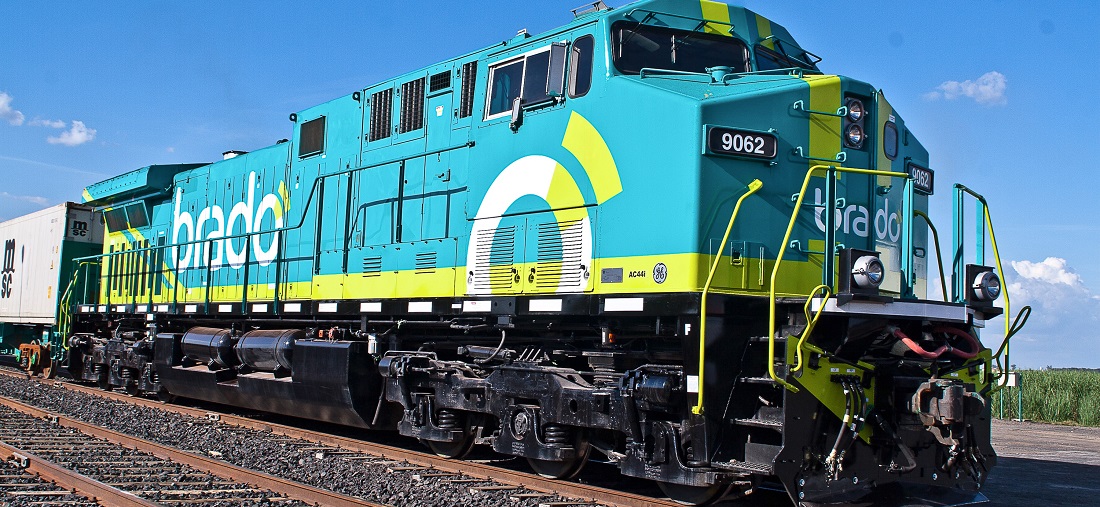
Logistics company Brado sees increased flow of frozen chicken to Brazilian ports
Jun, 16, 2023 Posted by Gabriel MalheirosWeek 2023
The global spread of avian flu has positioned Brazil as a key player in chicken supply, leading to record-breaking frozen meat exports in 2023. Aware of this trend, the logistics company Brado, a subsidiary of Rumo, saw a 16% increase in the transport of frozen meat by rail, reaching a historic mark of 8,346 containers in the first quarter.
While the highly pathogenic avian influenza virus (H5N1) has spread through Brazil, it has only been detected amongst wild birds, sparing commercial farms and allowing for uninterrupted domestic and international trade.
The chicken is transported from poultry farming regions in Paraná, Brazil’s largest producing state, to the port of Paranaguá. From there, it is shipped to countries such as China, South Africa, Japan, United Arab Emirates, the Philippines, and Mexico.
“The numbers reflect the growth of this market… Brazil experienced a 15.1% increase in chicken exports in the first quarter,” highlighted Graciele Santos, Accounts Manager at the company.
According to the ABPA association, the fast-paced shipping trend continued, resulting in a record 2.183 million tonnes of chicken exported by Brazil in the year up to May.
Yago Travagini Ferreira, Head of Animal Protein at Agrifatto consultancy, explained that it is challenging to determine the exact amount of chicken transported by rail in Brazil, as not all production regions have access to railroads. However, estimates suggest that between 20% and 40% of the protein shipped by the country relies on rail transport. Overall, most agricultural cargo is transported by road.
The primary advantage of rail transport is the cost savings it offers. Comparing the same route taken by Brado, Ferreira estimates that transportation by train results in a 6% to 10% cost reduction compared to truck transport.
“In addition, rail transport provides enhanced security, with a lower risk of theft, and ensures adherence to agreed-upon shipping schedules,” Ferreira added.
According to Brado, the containers are loaded onto trains with 41 wagons, covering a distance of 633 kilometers in approximately three and a half days until they reach the port. Graciele emphasized the significant improvement in railway productivity over the past few years. Previously, the transit time from Cambé (a producing region) to Paranaguá took five to six days. This reduction brings numerous benefits to Brado, as it deals with perishable cargo with high added value.
See below the exports of reefer containers from the Paranagua Container Terminal, a major gateway for frozen meats from Brazil into international markets, between Jan 2019 and Apr 2023. The data is from DataLiner.
Exports in reefer containers from Paranagua | Jan 2019 – Apr 2023 | TEU
Source: DataLiner (click here to request a demo)
The temperature inside the containers rises by about 1 degree each day they are turned off. Once at the port, they are recharged with energy and remain connected throughout the ship’s journey.
Source: Valor Econômico
To read the original piece, click on: https://valor.globo.com/agronegocios/noticia/2023/06/16/com-frango-sobre-trilhos-operacao-de-transporte-da-brado-tem-recorde.ghtml
-
Grains
May, 26, 2023
0
Wheat: Brazil has 151.122mt scheduled shipments for May
-
Sugar and Ethanol
Jan, 06, 2020
0
Brazil sugarcane productivity rises 4.9%
-
Other Logistics
Aug, 04, 2021
0
Investments in railways may increase demand for port terminals in the Northeast
-
Ports and Terminals
Apr, 06, 2022
0
Portonave successfully unloads Gripen F-39 fighter jets


